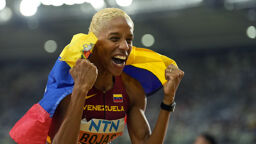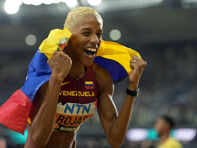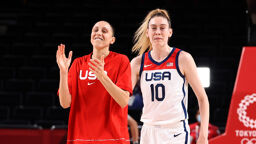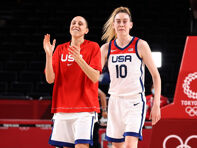From very early on, Randy Gardner wasn’t totally in the closet.
As a young Olympian transitioning into professional figure skating in the early 1980s, he found a small circle of support, including other gay men in the sport, who knew he was gay. Wary of the rejection of the outside world at that time, he kept his true self to that small circle.
Yet when he visited the figure skating competition years later for the 1994 Gay Games in New York City, it was a revelation. Here were athletes completely open about who they were, celebrating their true selves, with no worry that a judge might “ding” them for their sexual orientation.
"The freedom was inspiring,” Gardner recently told Outsports from his home in Los Angeles. “Everybody was doing what they wanted to do. The similar pairs — with two women or two men — was something I’d never seen in a competition. There was a lot of creative freedom and really good spirit.”
By this point in his professional career, Gardner had become unafraid to be out amongst all of his peers. He was a certifiable skating star with his partner, Tai Babilonia. The pair had won five United States Championships, won a World Championship in 1979, and qualified for two Olympic Games (finishing fifth in 1976 and being forced to withdraw in 1980, as the favorites, due to an injury).
Touring professionally with the Ice Capades was liberating for Gardner. While amateur figure skating is about the sport first, professional skating opened up a whole other world.
"I was making a good living, and I was socializing in my world, which was the entertainment business,” said the Los Angeles native. “It was more comfortable there for sure."
Gardner began exploring the life of a gay man in the late Seventies when he met another young male figure skater and the two hit it off. They dated for some time, enjoying each other’s company when they were competing or training at the same venue, which happened just enough to keep the relationship going.
It wasn’t until he left behind the world of amateur figure skating that his romantic life took off. Turning away from competitions toward professional skating tours gave him freedom, and his nagging need to keep attraction to men hidden from the people in his life faded.

Yet even as he explored some personal new-found freedom, two major events kept his true self in the closet.
In 1981, just as Gardner turned pro, tennis greats Billie Jean King and Martina Navratilova both came out as gay. The mixed negative public reaction these two lesbians’ news gave Gardner reason for pause. He was now skating in the family-friend Ice Capades. If Middle America had an issue with the openly gay skater, and if they stopped buying tickets, he had no career.
Plus, there were reports that King and Navratilova had lost sponsors, Gardner remembered. That had a chilling effect on him.
At the same time, daily news items surfaced about a new “cancer” that was killing gay men. The AIDS epidemic was in its infancy, and the stigma around gay men became at times unbearable.
While Gardner is thrilled to see the acceptance of LGBT youth today, he regrets that so many young LGBT people in 2017 have little knowledge of our community’s history, including the epidemic that sought to wipe us out.
With the advent of PrEP and other medications, LGBT teens may never experience the loss of a friend due to AIDS. For Gardner, just coming into his own as the “gay cancer” popped up in cities across America, it was a devastating chapter in his life even if it coincided with his rise in professional skating and newfound social and economic freedom.
“I lost so many friends,” he said. “I was keeping a list, then I had to stop because it was so many people. These wonderful people were dying. We were too young to be losing people in our 20s and 30s.”
The gay community fought back hard, pushing against a Federal government that at every level resisted helping the community fight the disease.
"Just to get them to take it seriously was a struggle,” Gardner remembered. “'Oh that's just the gay community. Let's let them go.'"
It was when women and straight people started to contract the disease that suddenly attitudes shifted. The faces of Ryan White and Arthur Ashe opened the public’s eyes to AIDS being something other than a “gay cancer.”
"Finally when that was realized, it changed the thinking."
While Gardner increasingly lived his life privately out over the years, it was only in 2006 that he publicly revealed that he was gay.
Gardner is inspired by the world young LGBT people are growing into today. The idea of legal same-sex marriage in the United States was an impossible thought for him 20 years ago, and now it’s reality. There are openly gay athletes, out actors and even an out sitting Senator. Seeing out gay athletes get endorsement deals with mainstream companies like Visa and Nike is something the professional skater never thought he’d live to see.
“I want the younger athletes to be comfortable and feel like they can talk about it. I want them to know they are loved."
All of it blows Gardner’s mind.
"I'm so happy now that they can be so accepting of themselves, and the world can accept them. A lot of people had to be in the closet for a long time. Some didn’t make it through all of that. Some didn't live. Today we'll always have that little section in the population that we have to deal with, but it's come so far.”
He’s also thrilled to see some of the world’s best skaters be openly gay. Adam Rippon, the 2016 U.S. National Champion, is one of his favorites.
"He's a great skater, a nice man and he's talented,” Gardner said of the Olympic hopeful. “I love watching him skate, and I think he's a good spokesperson."
Canadian skater Eric Radford has also caught his attention. Radford is an Olympic silver medalist who, with his partner Meagan Duhamel, won the world pairs championship in 2015 and 2016.
“Eric’s a great guy,” Gardner said. “Very well-respected. Very nice and mature. I think he's doing a lot for the gay community, especially in Canada.”
Next summer Gardner hopes to return to the Gay Games in Paris, this time as a skating judge, and he’s in touch with the people who can make that happen. Regardless, Gardner will continue to be an out spokesperson in his sport for living authentically, in hopes of encouraging others to do the same.
"Being an out gay athlete makes it easier for the younger generation. I think they need to hear from more of us mature athletes. I want the younger athletes to be comfortable and feel like they can talk about it. I want them to know they are loved."
You can find Randy Gardner on Facebook, or on Twitter @TheRandyGardner.







































